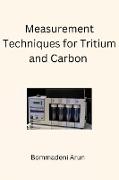- Start
- Measurement Techniques for Tritium and Carbon 14
Measurement Techniques for Tritium and Carbon 14
Angebote / Angebote:
Tritium and radiocarbon are pure beta emitters. Tritium has an average energy of 5.7 keV and endpoint energy of 18.6 keV [1]. Radiocarbon has an average energy of 49.5 keV and endpoint energy of 156 keV. The half-life of tritium and radiocarbon is 12.3 years and 5730 years, respectively. Hydrogen has three isotopes, namely hydrogen (1H), deuterium (2H), and tritium (3H). Among the three isotopes, tritium alone is a radioactive isotope. The natural abundance of hydrogen, deuterium, and tritium are 99.985%, 0.015%, and 1x10-18%. Carbon is also having three isotopes 12C, 13C, and 14C. The isotopes 12C and 13C are stable, whereas 14C is radioactive. The natural abundance of 12C, 13C and 14C are approximately 98.89%%, 1.11% and 1.2 x 10-10% respectively. Tritium is continuously produced in the atmosphere with cosmic-ray induced neutron activation of atmospheric gases. The reaction occurs with fast neutrons. The threshold neutron energy for the 14N (1n, 3H) 12C is 4 MeV [1].
Folgt in ca. 10 Arbeitstagen
